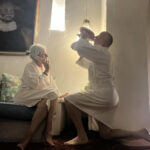It’s All About the Gig
Mark writes about the music industry – radio airplay, live concerts and artist perspectives.
Author: Mark Seymour, The Saturday Age.
Date: 15 February 2014.
Original URL: N/A.
Article Text
Driving home from the airport late one Sunday, I heard a Triple M DJ back announce a Hunters and Collectors song. “That was the mighty Hunters … victims of their own legend!”
I spent the rest of the journey trying to figure out how Hunters and Collectors were victims. The fans didn’t think so – none that I’d met anyway. Still, there was something in that phrase. What was that? I suspect it had something to do with the assumed pre-eminence of radio to make or break careers.
Great rock music demands attention. It is loud, emotionally compelling and socially inclusive. Rock music is the purest form of public engagement. As a singer I strive for that and the punters likewise. On any given night you raise the stakes as high as they’ll go. And a rock band’s trajectory is always to get bigger: bigger crowds, bigger production, bigger everything, including radio exposure. Bands go out and generate massive emotional energy, live on stage. And, of course, radio airplay helps, there’s no doubt. But with the wisdom of my years, I’m certain of one thing: bands do the heavy lifting while radio comes later, and rides the tiger. Triple M is no exception.
Hunters and Collectors didn’t get commercial airplay until 1989, by which time the band had already released six albums and toured the US and Europe twice. Triple M stopped adding our new releases in 1993, but the band released another three albums and toured to full houses for another five years. There’s a lesson in that, I think. It makes me wonder, do rock bands really need radio? How far would bands get if radio withered away entirely? Certainly social media is making profound inroads into the marketing of music. YouTube is crucial. And yet, singers like me can still be heard carping about the fickleness of radio. Every time Triple J wheels out its top 100, the furore is stratospheric. Who was on it? Who wasn’t? Who got dropped? Who got added? When I consider how many radio networks I’ve petitioned unsuccessfully in the 33-odd years I’ve been in the game, this so-called controversy looks a little overcooked.
Aussie musicians need to manage their self-respect a bit better, before and after the lights go out. Get real friends.
Radio programmers add songs to playlists for all sorts of reasons. As Chris Scaddan of Triple J has rightfully pointed out, sometimes it’s got something to do with how good the songs actually are! And sometimes it has to do with personal taste. Let’s face it, programmers are only human after all. On occasion I ask myself … Would I want that gig? I don’t think so. I couldn’t handle the hate mail.
When you get regular airplay, you don’t question it. It follows the natural course of events. You are a very talented young songwriter and you deserve it. But when you don’t get it the next time, suddenly a whole heap of analysis is required. You scour the airwaves for artistic hypocrisy. Because you’re only human too. But if radio turns its back on you, as it has on me many times, remember, it was always entirely your decision to go out on the road and play, which is how you got noticed in the first place. Play to your strengths. Start owning your gig. It’s amazing how uplifting simply playing music can be because, in the end, it’s all about the gig. And on that note, I’d just like to thank everyone for turning up.
Hunters and Collectors support Bruce Springsteen today at AAMI Park.
Comments
N/A.





